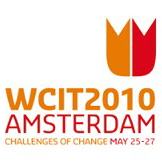4) Constructively exploiting the opportunities from globalisation
Constructively exploiting opportunities from globalisation.

The internet is a global phenomenon with great local impact. It creates opportunities for all countries and every citizen in the world.
However, today, these opportunities are unevenly distributed. To address this imbalance it is necessary to reduce the digital divide between the developing and the developed world. Access to the internet, and to the information and knowledge it contains, needs to be improved. The deployment and diffusion of ICT can also promote pluralism. Governance of the internet needs to be representative for every country in the world.
- Governments should create, in close consultation with the private sector, the appropriate framework to foster investment in high speed ICT infrastructure in developing and emerging countries.
- Governments in developed and developing countries, the ICT industry and other stakeholders should work closely together to construct and implement awareness, education and training programmes. These should be adapted to developing and emerging countries’ needs to raise their levels of digital literacy and eSkills.
- The ICT industry is encouraged to develop and bring to the market ICT products and services that meet the needs of developing countries and are fit for use in their emerging ICT infrastructures, which are often based on mobile technologies.
- Governments should ensure that the overall framework of internet governance continues to evolve in line with the Tunis World Summit on the Information Society (WSIS) principles of transparency, multilateralism and democracy.
- Governments should advance increased internationalisation of internet governance as a whole, especially coordination and management of the domain name system, which should comply with the best governance standards.
- All stakeholders should agree to support the maintenance and development of the Internet Governance Forum (IGF) as an open place for meeting, dialogue and exchange of best practices between governments, civil society and the private sector.
- Governments, particularly in developing and emerging countries, should work on, and be helped with, fast-track appropriate ICT legislation and policies. These should boost job creation, tackle cybercrime, strengthen cyber security and improve general service delivery to citizens.